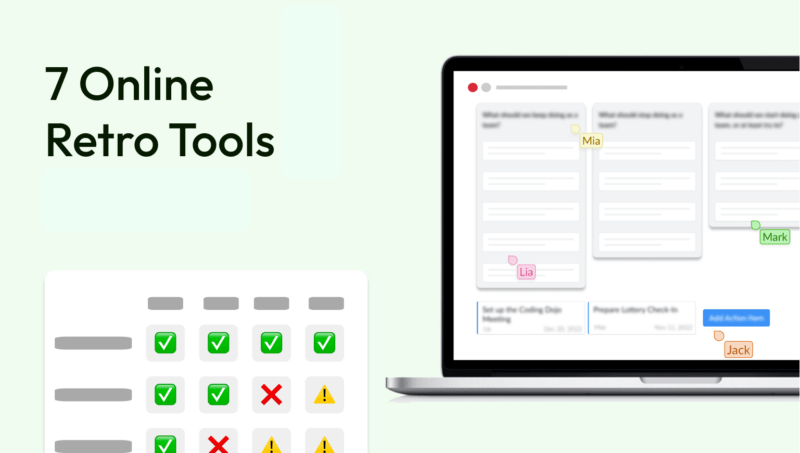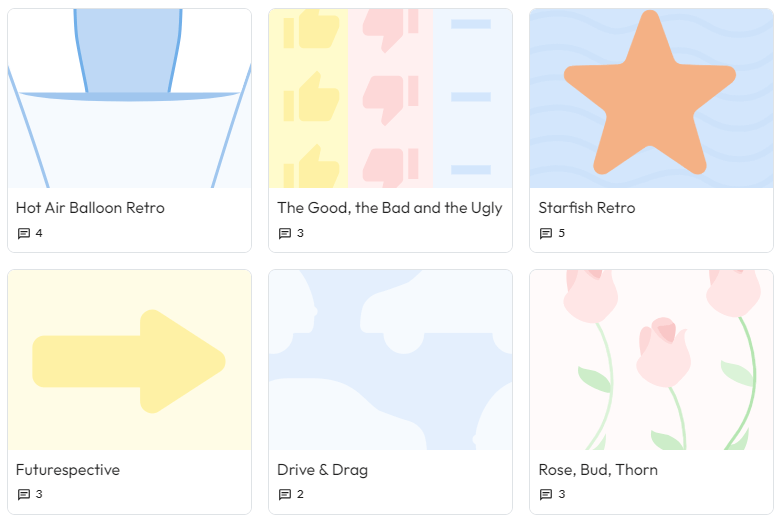Do you want your boss to love you? Well, then increase the performance of your team! Go from being an average car to being an explosive rocket.
How? Download my free and science based eBook on "Reaching team flow in 12 easy steps" and take is seriously. But now let's get to the actual topic of this text.
English text...
In one study , 77% of the participants reported that they are more productive working from home. 45% seem to even sleep better as a result. So the answer seems to be “yes”.
For the iterative agile work according to Scrum and Co., which is designed for transparency, remote work seems to be the wrong format - right? But - you just have to approach team building with the right format. Let's focus on one of the most important events in the agile framework: the agile retrospective.
A remote retro (retrospective) that is fun
In the first step, the technology should of course already be in place for a remote retro. More specifically, working video call tools should be available. In my experience, Zoom is the most stable tool for this, but Whereby.com, Microsoft Teams, Skype for Business & Co. can be good alternatives.
A good remote retrospective, much like an on-site retro, must also manage to integrate the knowledge and experience of all team members and to strengthen mutual trust.
To lay the foundation for this, you should start with a good check-in format that brings every team member in. Everyone should say something. In the best case, this promotes a positive mood for the retrospective.
An example of a check-in question
As an example, here is a question that Google likes to ask internally to also promote psychological security: What did you do last weekend? Alternatively, if the remote retrospective is conducted towards the end of the week, you can also ask: What are you planning to do next weekend?
If the answer to the question is "I was walking the dog" or "I had to do a large purchase again - it always makes us appear human and promotes mutual trust.
Remote Retrospectives - focus on trust
As an additional simple “trick” for promoting trust and general team building, all team members should switch their cameras on so that they can see each other. This can also make the format livelier.
In general, the same rule of thumb applies to remote retrospectives as well as to on-site retrospectives - make them diverse. The team should be regularly surprised and not fall into a rut that would slow down creativity for targeted measures or action items. You can of course always use the classic boards, but at least the method or format - e.g. “Keep Stop Start”, “Mad Sad Glad” & Co. - should vary on the board.
In my opinion, you can make an exception here: the gratitude question. As a psychologist, I can recommend giving each retro a brief space for the following question: What are you thankful for, based on the last two weeks? This would be possible, for example, during check-in, during data gathering, or during check-out. For this, you don't need to hold onto a board.
Studies showthat this simple question of gratitude helps to focus the mind on positive things - which has been proven to increase overall satisfaction long term in this simple format.
For many, one goal of retrospectives is to promote the agile mindset. Using these measures mentioned, you are well on your way to promoting this. In this context, I would still like to mention my blog article about amazing truth behind the agile mindset , which can further support you in achieving these specific goals.
Use what is already there - Remote Retro Tools
The proportion of speeches during retrospectives is usually relatively unevenly distributed. It is also difficult to keep the retro interactive without support. For these reasons, you should use a retro tool as well as video calling software if possible.
There are now countless retro tools such as Retrium Board or Retro board free: TeamRetro. But especially Echometer was developed for the best remote retrospective possible. Compared to other tools, Echometer was developed from the psychological perspective of team development (read more: The 6 Best Retrospective Tools for Remote Teams).
On the one hand, Echometer focuses on the mindset, focusing at the agile values. On the other hand, team development becomes psychometrically measurable in order to make the necessary successes visible to the team and to promote their self-efficacy.
With the help of the tools mentioned, remote retros sometimes even offer advantages because it may be easier for some to express their opinion over writing. The physical distance and familiar environment leads to a higher subjective security to speak about difficult topics. With a little practice, this can also be used to speak about things that would otherwise never be revealed - and to try to make a quantum leap in team development.
The basic version of Echometer is free of charge. If you want to try it out – right here or start for free.
| Evaluation criteria | Echometer | Retrium Board | Team Retro | FunRetro former EasyRetro Board | Parabol Board | MetroRetro Board |
|---|---|---|---|---|---|---|
| Interactive online retrospectives |  Yes Yes |  Yes Yes |  Yes Yes |  Yes Yes |  Yes Yes |  Yes Yes |
| Automatically generated retro summaries |  Yes Yes |  Yes Yes |  Yes Yes |  Yes Yes |  Yes Yes |  Yes Yes |
| Supported facilitation (Check-In Generator etc.) |  Yes Yes |  Yes Yes |  Partially Partially |  No No |  Partially Partially |  Partially Partially |
| Templates for every level of team maturity |  Yes Yes |  Partially Partially |  Partially Partially |  No No |  No No |  No No |
| Continuous tracking of action items (retro to retro) |  Yes Yes |  Partially Partially |  Partially Partially |  No No |  Yes Yes |  No No |
| Team development measured over time |  Yes Yes |  Partially Partially |  Yes Yes |  No No |  No No |  No No |
| Collecting feedback before retros (optional) |  Yes Yes |  No No |  No No |  No No |  Yes Yes |  No No |
| Organizational Health Checks |  Yes Yes |  No No |  No No |  No No |  No No |  No No |
| Health Check Item Pool with nudges (food for thought) |  Yes Yes |  No No |  No No |  No No |  No No |  No No |
| Mobile Device Support for on-site retros |  Yes Yes |  No No |  No No |  No No |  No No |  No No |
| Integrated Online-Whiteboard |  Yes Yes |  No No |  No No |  No No |  No No |  Yes Yes |
| Data protection (developed and hosted in Europe) |  Yes Yes |  No No |  No No |  No No |  No No |  No No |
| Free version (after trial) |  Yes Yes |  No No |  No No |  Yes Yes |  Yes Yes |  Yes Yes |
Actions and completion in remote retros
The same applies to the measures in remote retros and to on-site retros: It is better to define a few good measures rather than many where some may not implemented (which would be counterproductive for team building).
In another text I explained in detail how important a common mental model of all team members is for the success of a retro and for team building. This applies all the more to remote retrospectives. To derive good measures and (not only) regarding being able to communicate efficiently, everyone should speak a common language. You can find more information in my corresponding blog post.
Especially if remote retros are rarely performed by you, the retro should end with a meta reflection. How did our remote retro go and what should we keep next time, what should we change? This is a round conclusion for a retro - after all, a format of "continuous improvement".
By the way, if you are still looking for specific, varied methods for your remote retro, please have a look at my blog article on this:
Are you still looking for methods for your remote retro? Then these 4 insightful remote retro methods are interesting for you:
Above-average remote retros
If you take all of this into account, your remote retro will beat least above average. Have fun during team building!
You can find more here general tips on remote team building. And here you should take a look if you want creative exercises for your on-site retros.
If you are searching for fun retrospective ideas, check out our post on 54 Kickass Retrospective Ideas for Agile Teams (including the Mario Kart Retro & the Team Morale Health Check).










